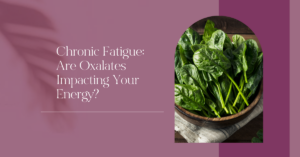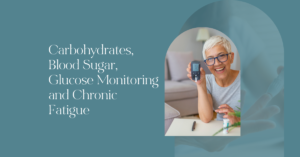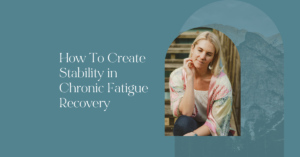Most people complain that they feel tired at least on a weekly basis, if not daily. The pace of life is fast and the demands are high. In some respects it is “normal” to feel tired if you work hard, play hard and burn the candle at both ends.
This type of fatigue can usually be alleviated by a bit more down time and a few good sleeps. But, if you are experiencing fatigue that is impacting your ability to maintain your lifestyle and it doesn’t improve with an increase in sleep, good nutrition and self care, it is time to dig a bit deeper as there may be something more complex that needs to be addressed.
I work with knowledgeable women who already know the basics of good nutrition, sleep, exercise and maybe even a bit of meditation or breathwork. Yet, despite their best efforts, they may still:
- Wake unrefreshed
- Rely on caffeine and sugar to get through the day (even when they know better)
- Experience malaise after exercise or exercise gives them a lift but they crash several hours later
- Experience brain fog, headaches and migraines
- Experience hormonal symptoms, PMS or cyclical energy crashes
- Find they are able to achieve less and less week after week with little energy left to enjoy life
If you are one of these women and you’ve tried the basics of eat better, sleep better and increase self care and yet you are still struggling with your health and energy, here is what you may want to consider.
Under-Eating
It seems almost too obvious but under-eating often gets missed in health conscious women. Before I had my own energy crisis I ran a weight loss program for several years. One of the (many) lessons I learnt from this experience was that when people start to eat healthy, they can often under-eat. This is because healthy foods tend to be lower in calories and much more filling.
Busy women who are health conscious may undereat because they are running on adrenaline and may be disconnected from their hunger signals. They may eat because it’s time to eat or because they have a break in meetings, they make healthy choices but they don’t get enough food in before they have the rush off to pick up the kids, give a presentation or speak with a client.
An easy way you can check if you are under-eating is to use an app like MyFitnessPal. Commit 1-2 weeks to weighing, measuring and logging your food and you’ll notice if you have any drastic deficits. We all require different amounts of fuel depending on body size and activity levels but around 1800-2000 calories, on average, is a good target.
Blood Sugar Imbalances
Blood sugar highs and lows will have a dramatic effect on how you feel day to day. When blood sugar is too high, it doesn’t penetrate the brain and this impacts brain energy and clear thinking. When blood sugar is too low, we just don’t have enough resources available and stress hormones kick in to help us out. This can increase anxiety and leave us feeling jittery. Some people like this feeling but it isn’t sustainable as you are operating on borrowed energy which will eventually need to be replenished.
If you want to learn more about balancing blood sugar you can take my blood sugar mini-course which will teach you the in’s and out’s of how to stabilise and monitor your glucose levels.
Nutrient Deficiencies
There are multiple nutrient deficiencies that can negatively impact energy for various reasons. The “big rocks” I focus on first and foremost with clients are:
- Vitamin B12
- Folate (Vitamin B9)
- Vitamin B6
- Iron
These nutrients are important for making healthy red blood cells. We make energy in the presence of oxygen which means that we need healthy red blood cells to transport oxygen around the body. Low levels of B12, folate, B6 and Iron may result in poor oxygen transport and anaemia.
I like to use a Full Blood Count and Iron Panel as a starting point and then an Organic Acids Test if required.
If you would like to learn more about how poor oxygenation could be affecting your energy levels, including how to interpret your own blood work, then my Oxygenation Mini Course is a good place to start.
Hormone Imbalances
Hormones are the communication molecules of the body. They carry messages and sometimes these messages can be to make more energy and sometimes they can be to make less energy.
Low thyroid hormone, low testosterone, low progesterone, low oestrogen, low cortisol and DHEA could all have an impact on energy availability and therefore testing can be helpful to rule these out.
I like the Medichecks Thyroid Panel and the Dutch Comprehensive Hormone Panel with Cortisol Awakening Response (CAR) for sex and stress hormones.
Hormone imbalances are usually more downstream consequences of other imbalances so if you discover that your hormones are a little out of balance you may want to consider what is happening upstream with things like:
- Nutrition and nutritional deficiencies
- Blood sugar balance
- Digestive health
- Detoxification
Digestive Health
Many people often struggle to draw the parallels between gut health and what is happening in the rest of the body. But the truth is that 70%-80% of our immune system is located in and around the gut membrane and there is also a two way communication between the gut and the brain. In fact, the gut is often referred to as the second brain and for this reason, any digestive imbalances could have an impact on brain energy and your overall cognitive function, energy and wellbeing. That is just one reason why it is important to address digestive health when it comes to fatigue but there are many others.
If you experience:
- Bloating
- Constipation
- Diarrhoea
- Loose stools
- Cramping
- Flatulence
- Reflux
- Changes in energy after a meal
Then you may want to consider addressing digestive health as you work towards improving your energy. The Digestive Health Mini Course is a great place to start.
Toxic Overload
Toxins are a source of threat to every cell in the body and when the total body burden of toxins becomes too high, the function of the cell suffers.
The unfortunate truth is that toxins are everywhere are include:
- Heavy Metals
- Biotoxins produced from bacteria, mold and yeast e.g. mycotoxins and endotoxins
- Plastics
- Environmental pollutants
- Personal care and home cleaning products
- Pesticides on fruit and vegetables
One of the many consequences of a body overloaded with toxins is poor energy production resulting in symptoms such as brain fog, fatigue and pain. Actively avoiding toxins and supporting their clearance from the body is essential to recovery cell function, energy production and health.
Infections
In recent years the rise in “Long-Covid” cases has brought the impact of infection on the immune system and the body’s energy systems into the public eye.
We all know how it feels to have an acute bout of the flu; fatigued, achy, brain foggy, low in motivation and even small tasks can be exhausting. These symptoms are not the flu virus per se, but rather the consequence of energy being prioritised towards the immune system to help the body manage the threat of the invading pathogen.
A healthy body with a healthy immune system should be able to resolve the threat within 4-7 days and if not, at least 6 weeks. But when the immune system is not able to find resolution the body may become stuck in a chronic low grade inflammation where the same symptoms of low energy and brain fog are present but not at the same intensity as a full blown flu.
I like to use a Full Blood Count to see if there are any lingering infections, CRP can also be useful. There are also various tests for viruses, lyme disease and co-infections and mold mycotoxins.
If an unresolved infection is suspected we want to support the immune system to find resolution and return to a more “rested” state. This is a multi-layered approach and beyond the scope of today’s blog.
Nervous System Dysregulation
The autonomic nervous system governs our survival physiology; fight, flight and freeze. The pressures and demands of daily life, childhood trauma and stressful events as adults can all impact the balance of time that we spend in the sympathetic nervous system (responsible for fight or flight) and the parasympathetic system (responsible for rest and repair).
When we get “stuck on” we are stuck in fight or flight and if this becomes too much we can also get “stuck off” which means that the body shuts down and enters a freeze. Our ability to handle stress narrows and even small things can feel really big and send us off balance, perpetuating the cycle.
Energy and resources are directed towards survival and away from body maintenance, repair and healing. The consequence is often increased anxiety, poor sleep, changes in digestion, poor immune tolerance, feeling tired but wired or just plain tired!
Restoring energy almost always comes hand in hand with learning to support the nervous system. We don’t learn this stuff in school, but we should because it is a game changer! A good place to start in the Nervous System Mini Course or you can consider joining the next round of Nurturing Resilience, the 12 week group program.
Need Some Help?
As you have probably gathered by now, getting to the bottom of your fatigue can be complicated. It takes time and patience to identify what is going on and restore the body to balance – I know, I’ve been there too!
The good news is that you don’t have to do it alone and if you’d like some help there are a few ways you can work with me. Check out the options here.










